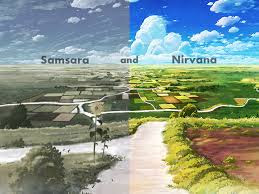Some have suggested that all of us have our very own question, the question above all others. One that we have to find an existential, living answer to, beyond the intellect. I'm not really sure about this - but if it is so, then I have never found exactly what mine is. Apparently the 13th century zen master Dogen had his very own question, the one that set him on the path.
It was this:- If we are indeed naturally endowed with Buddha Nature then why practice?
Dogen set out to find the answer, leaving his home in Japan and travelling to China where he met with, and was taught by, various Ch'an masters.
 |
| Bodhidharma, the man who took Buddhism to China, "Buddhism" there becoming Ch'an. And in becoming Ch'an it was asked "why did Bodhidharma come from the West" - when in fact there is nothing to teach. |
Dogen, having actually become his "answer", then returned to Japan. Reading much of his output - paradoxically, always a good thing to do when studying zen, the "teaching beyond words and letters"- I think the simplest words to sum up Dogen's answer is that the "journey is home", or in his case, "practice is itself enlightenment." Signposts to this can be found in many writings, not least in those of Thomas Merton, who said once that "we already possess God", yet "how far we have to go to find You, in Whom we have already arrived." Intimations of the very same answer can be found in the poetry of T S Eliot and the travel sketches of Basho in his "Narrow Road to the Far North." Could it be that whatever our very own question is, the "answer" will be the same? Which would give a whole new take on the "only way".
 |
| Basho on his travels. There is a lovely section of his book where he speaks of the horse. |
Well, I'm waffling as usual, and I think I've even lost track of what all this was a preamble to. Something to do with the Bodhicharyavatara........
Yes, I was reading through Chapter One, titled "The Excellence of Bodhichitta", and after Shantideva speaks of the benefits of "habituating" our mind with his "unskillful prosody" (!) he then speaks of how we now find ourselves with the "ease and wealth" to apply ourselves to it. Our time is NOW. The chance is now ours - when will it be ours again? I always recognise that the urgent call to seize the moment grates slightly upon just "letting things become so of themselves, beyond all calculation".
Anyway, here is the verse:-
So hard to find the ease and wealth
Whereby the aims of beings may be gained.
If now I fail to turn it to my profit,
How could such a chance be mine again?
Shantideva then moves on to speak of the "marvelous tree of bodhichitta" that unlike every other fruit, "constantly bears fruit and grows unceasingly."
Here is the verse:-
All other virtues, like the plantain tree,
Produce their fruit, but then their force is spent.
Alone the marvelous tree of bodhichitta
Constantly bears fruit and grows unceasingly
 |
| The Plantain tree |
Sometimes I think here of the words of Jesus as recorded in the Gospels, "they have their reward". Yes, each and every virtue, when the product of calculation, receives its due "reward". The pride in it, or perhaps the pride of taking no pride, and the "virtue" has gone. But the love that knows no why, the love of no calculation, grows unceasingly, the flowering of emptiness. Selfless love.
Just a final few words from the text, found in Chapter Two:-
I will be undaunted by samsara.
Samsara, our world of birth and death, can be pretty daunting at times. If not always for ourselves, then certainly for many others. Here are some images of samsara:-
 |
| (This last image contains the idea of "seeds" being found in our world of birth and death. Seeds of what?) |
But back to "daunting". Really, "daunting" often seems totally inadequate when I cast my mind over the terrible history of our world. Shinran, one of the fathers of Pure Land Buddhism, had a great deal of honesty. Despite the "daunting" nature of the world, he yet recognised in himself the wish to remain within it, with all its various pleasures. He felt great shame that this was so. On the other hand, he wrote that the greater the ice, the greater the water; the greater the hindrance, the greater the virtue.
 |
| Ice and water |







No comments:
Post a Comment